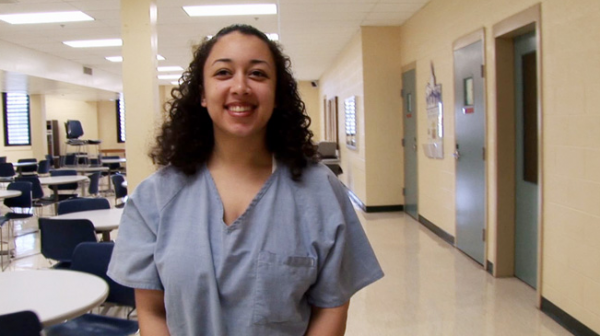
Cyntoia Brown was released from the Tennessee Prison for Women early Wednesday morning, after serving 15 years of a life sentence for killing a man who solicited sex when she was a teenager.
Brown says she hopes to dedicate her next chapter to mentoring girls who have suffered abuse.
Brown was convicted in 2006 for fatally shooting Johnny Allen, a 43-year-old man who had picked her up at a drive-through restaurant and taken her home. Police and prosecutors say Brown planned to rob him; Brown says she acted in self-defense, believing Allen was reaching for a gun.
Brown was 16 at the time. Advocates for Brown have argued that, as a teen who was being sex trafficked, she should not have been tried as an adult and given a life sentence.
Yasmin Vafa of the Washington, D.C.-based organization Rights4Girls researches the sexual abuse to prison pipeline and says stories like Brown’s follow a common narrative: a history of sexual abuse.
“They should be afforded the same treatment and interventions as any other child abuse victim,” Vafa says. “But, you know, what we’re actually seeing is an even more aggressive form of victim blaming, where we are actually punishing and incarcerating girls for being survivors of violence.”
Former Gov. Bill Haslam granted Brown clemency in January, saying her original sentence was too harsh. He also applauded the steps she’d taken toward rehabiliation, like earning a bachelor’s degree and mentoring at-risk youth.
Brown’s parole conditions require that she continue her community service, according to a press release from the Tennessee Department of Correction.
“I thank Governor and First Lady Haslam for their vote of confidence in me,” Brown said in a prepared statement. “And with the Lord’s help I will make them as as well the rest of my supporters proud.”
Cyntoia Brown declined interviews upon her release, but she said in her statement that she wants to use her experiences “to help other women and girls.” Brown’s attorney tells The Tennessean that she’s also working on a memoir and married while behind bars.
Brown’s release came after an intense social media campaign highlighting her case. Celebrities including Kim Kardashian West and Rihanna called for her release, while experts on sexual abuse said it was unlikely that Brown would have been tried as an adult or given a life sentence if she had been tried today.
Haslam Under Mounting Pressure To Commute Life Sentence Of Cyntoia Brown Vafa says many girls have fallen into a pipeline that begins with arrests for misdemeanors, like running away and truancy, and ends in prison. When law enforcement officials don’t take girls’ trauma into account, she says, the charges can escalate.
Vafa says she hopes Brown’s story will motivate them to focus less on punishment and more on healing in similar cases in the future.
“It’s really important to educate judges, defenders, as well as prosecutors on the trauma, the harms, the levels of violence that are experienced so that they could have a better understanding of why a survivor might act out in a violent manner in these types of situations,” Vafa says.
She thinks that trauma should factor into “what charges are ultimately decided on and what punishment is ultimately settled on.”
The rate of girls in the juvenile justice system is increasing, according to a 2015 report Vafa coauthored with researchers from the Georgetown Law Center on Poverty and Inequality and the Ms. Foundation for Women. They found that those girls also experience sexual violence at disproportionate rates.
A 2006 study of girls in Oregon’s juvenile justice system found that 93% of them had experienced some form of abuse. More than three quarters had been subjected to sexual abuse at least once before the age of 13.
And in a 2009 study of girls in South Carolina’s juvenile justice system, 81% reported a history of sexual violence.
“We’re talking about some of the most vulnerable members of our society,” Vafa says.
Samantha Max is a Report for America corps member.

